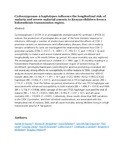Cyclooxygenase-2 haplotypes influence the longitudinal risk of malaria and severe malarial anemia in Kenyan children from a holoendemic transmission region.

View/
Date
2019-10-29Author
Anyona, Samuel B
Hengartner, Nicolas W
Raballah, Evans
Ong'echa, John Michael
Lauve, Nick
Cheng, Qiuying
Fenimore, Paul W
Ouma, Collins
Lambert, Christophe G
McMahon, Benjamin H
Perkins, Douglas J
Metadata
Show full item recordAbstract
Cyclooxygenase-2 [(COX-2) or prostaglandin endoperoxide H2 synthase-2 (PTGS-2)] induces the production of prostaglandins as part of the host-immune response to infections. Although a number of studies have demonstrated the effects of COX-2 promoter variants on autoimmune and inflammatory diseases, their role in malaria remains undefined. As such, we investigated the relationship between four COX-2 promoter variants (COX-2 -512 C > T, -608 T > C, -765 G > C, and -1195 A > G) and susceptibility to malaria and severe malarial anemia (SMA) upon enrollment and longitudinally over a 36-month follow-up period. All-cause mortality was also explored. The investigation was carried out in children (n = 1081, age; 2-70 months) residing in a holoendemic Plasmodium falciparum transmission region of western Kenya. At enrollment, genotypes/haplotypes (controlling for anemia-promoting covariates) did not reveal any strong effects on susceptibility to either malaria or SMA. Longitudinal analyses showed decreased malaria episodes in children who inherited the -608 CC mutant allele (RR = 0.746, P = 1.811 × 10-4) and -512C/-608T/-765G/-1195G (CTGG) haplotype (RR = 0.856, P = 0.011), and increased risk in TTCA haplotype carriers (RR = 1.115, P = 0.026). Over the follow-up period, inheritance of the rare TTCG haplotype was associated with enhanced susceptibility to both malaria (RR = 1.608, P = 0.016) and SMA (RR = 5.714, P = 0.004), while carriage of the rare TTGG haplotype increased the risk of malaria (RR = 1.755, P = 0.007), SMA (RR = 8.706, P = 3.97 × 10-4), and all-cause mortality (HR = 110.000, P = 0.001). Collectively, these results show that SNP variations in the COX-2 promoter, and their inherited combinations, are associated with the longitudinal risk of malaria, SMA, and all-cause mortality among children living in a high transmission area for P. falciparum.
Collections
- Gold Collection [1026]
